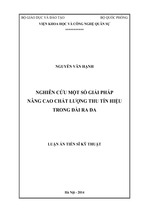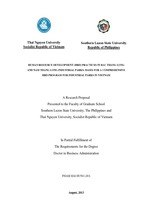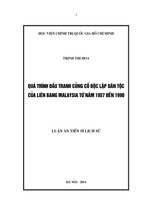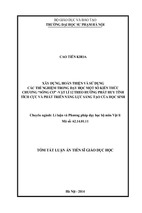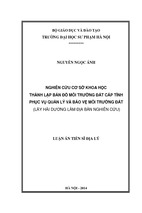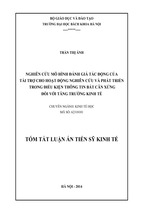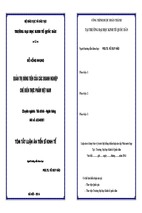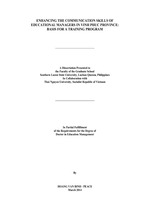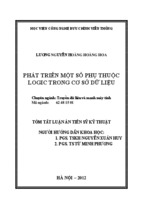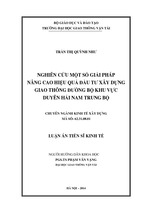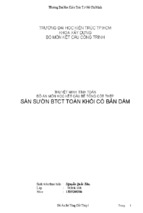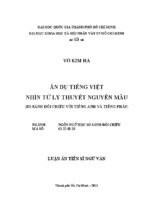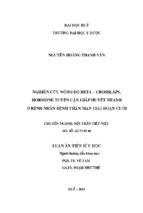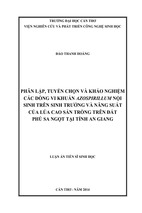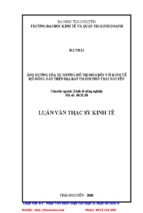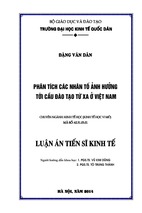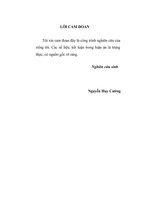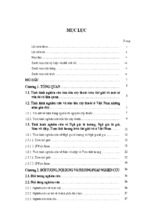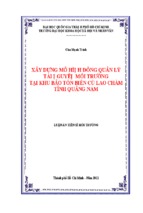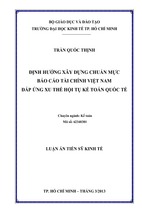i
THAINGUYENUNIVERSITY
SocialistRepublic of Vietnam
BATANGASSTATEUNIVERSITY
Republic of the Philippines
LANGUAGE ACTIVITIES FOR IMPROVING THE LINGUISTIC
COMPETENCE OF FIRST YEAR STUDENTS
IN THAINGUYENUNIVERSITY
A Dissertation
Presented to
The Faculty of Graduate School
BatangasStateUniversity
Batangas City, Philippines
In Partial Fulfillment
Of the Requirements for the Degree
Doctor of Philosophy
Major in English
By:
NGO THI BICH NGOC (SARAH)
November, 2014
i
THAINGUYENUNIVERSITY
SocialistRepublic of Vietnam
BATANGASSTATEUNIVERSITY
Republic of the Philippines
APPROVAL SHEET
This dissertation entitled LANGUAGE ACTIVITIES FOR IMPROVING
THE LINGUISTIC COMPETENCE OF FIRST YEAR STUDENTS
IN THAI NGUYEN UNIVERSITYprepared and submitted by Ngo Thi Bich
Ngoc in partial fulfillment of the requirements for the degree of Doctor of
Philosophy in English has been examined and is recommended for Oral
Examination.
MATILDA H. DIMAANO, Ph.D.
Adviser
PANEL OF EXAMINERS
Approved by the Committee on Oral Examination with a grade of
……….
.......................
Chairman
……………..
Member
…………………….
Member
……………..
Member
……………..
Member
Accepted and Approved in partial fulfillment of the requirements
for the Degree of Philosophy in English.
Comprehensive Examination: ………..
.........................
Dean
ii
THAINGUYENUNIVERSITY
SocialistRepublic of Vietnam
BATANGASSTATEUNIVERSITY
Republic of the Philippines
ABSTRACT
Title
: Language Activities for Improving Linguistic
Competence of the First Year Students in Thai
Nguyen University
Author
: Ngo Thi Bich Ngoc
Degree
: Doctor of Philosophy major in English Language
Literature
Major
: English
Year
: 2014
Adviser
: Dr. Matilda H. Dimaano
Summary
This study attempts to determine the level of Linguistic
Competence of the First Year Students at Thai Nguyen University for
the school year 2014. Specifically, it seeks to answer the following
questions:1)
What is the level of linguistic competence using the
following:connotation, denotation, antonyms, synonyms, ambiguities,
andvocabulary. 2)
What is the level of understanding of students on
word-formation in terms of
compounding. 3)
acronym,
clipping,
blending and
Which among the items in the different cluster
students find most difficult? 4)
How do the teachers assess the
linguistic competence of the students? 5)
difference between teachers‟ assessment and
Is there a significant
iii
THAINGUYENUNIVERSITY
SocialistRepublic of Vietnam
BATANGASSTATEUNIVERSITY
Republic of the Philippines
students‟ competencies? and 6) What English language activities
may be suggested to improve
students‟ understanding of English
words and concepts?
A questionnaire for teacher for teacher and a teacher made test for
students were used to determine the level of students‟ linguistic
competence and the relationship between teachers‟ assessement and
students‟ results. The research found out that the over-all linguistic
performance of the students is generally better, as the students were
able to demonstrate an average level of linguistic competence.Students
have average level of understanding in word formation.The items found
most difficult under the cluster of linguistic competence are items (8) for
connotation,(20) for denotation, antonyms (28), synonyms (34), and
ambiguities (44). For vocabulary cluster is item (55), while for word
formation cluster, the items that are found to be most difficult are the
following: acronym item (69), clipping (74), blending (87), and
compounding (93). Linguistic skills are not frequently used or practiced
by the students as perceived by the teacher respondents. There‟s no
relationship exists between the teacher‟s assessment and the level of
students‟ linguistic competencies as indicated by the significance of the
p-value at 0. 05 levels and the language activities that composed of set
of
exercises
were
designed
for
improving
students‟
linguistic
competencies in the areas of connotation, antonyms and acronyms
iv
THAINGUYENUNIVERSITY
SocialistRepublic of Vietnam
BATANGASSTATEUNIVERSITY
Republic of the Philippines
ACKNOWLEGEMENT
The researcher wishes to express her sincerest thanks and
appreciations to those who in one way or another have helped me make
this piece of work a reality.
Dr. Dang Kim Vui, Thai Nguyen University President for his effort
to improve English language Education in Viet Nam
Dr. Matilda H. Dimaano, her adviser, for the knowledge shared
in patience in editing the manuscript in consonance with academic
writing norms and most of all, for the trust in the research that motivated
her to complete this study
Dr. Nguyen The Hung, Director of International Training and
Consultancy Center for his encouragement.
The teachers and students respondents of the study, for their
active involvement and cooperation,
Her ever dearest friends, for their encouragement and support
Her affectionate parents and sibling, for the love, concern and
understanding and for being her great inspiration in pursing this
endeavor.
N.T.B.N
v
THAINGUYENUNIVERSITY
SocialistRepublic of Vietnam
BATANGASSTATEUNIVERSITY
Republic of the Philippines
Dedication
This dissertation is dedicated
To my loving and ever supportive husband, Mr. Le Huy and my loving
sons, Le Minh, to my family, and to my dear UTT community
N.T.B.N
vi
THAINGUYENUNIVERSITY
SocialistRepublic of Vietnam
BATANGASSTATEUNIVERSITY
Republic of the Philippines
TABLE OF CONTENTS
Page
TITLE PAGE………………………………………………………......
APPROVAL SHEET………………………………………………….
i
ABSTRACT……………………………………………………………
ii
ACKNOWLEDGEMENT…………………………………………......
iv
DEDICATION………………………………………………………….
v
TABLE OF CONTENTS……………………………………………...
vi
LIST OF TABLES………………………………………………….....
ix
LIST OF FIGURES……………………………………………………
xi
CHAPTER
I. THE PROBLEM
Introduction............................................................
1
Statement of the Problem…………………………..
7
Scope, Delimitation and Limitation………………...
8
Significance of the Study……………………………
9
II. REVIEW OF LITERATURE
Conceptual Literature……………………………….
11
Research Literature………………………………….
50
Synthesis……………………………………………..
55
Theoretical Framework……………………………..
58
vii
THAINGUYENUNIVERSITY
SocialistRepublic of Vietnam
III.
IV.
BATANGASSTATEUNIVERSITY
Republic of the Philippines
Conceptual Framework……………………………..
62
Hypothesis……………………………………………
64
Definition of Terms…………………………………..
64
RESEARCH METHOD AND PROCEDURE
Research Design…………………………………….
66
Research Environment ...................................
66
Subject of Study……………………………………..
69
Data Gathering Instrument………………………….
71
Data Gathering Procedure………………………….
73
Statistical Treatment of Data……………………….
75
PRESENTATION, ANALYSIS AND
,,,,,,,,,,,,,,,,,,INTERPRETATION OF DATA……………………………
V.
76
SUMMARY, CONCLUSIONS AND
RECOMMENDATION
Summary of Findings ..............................................
118
Conclusions ............................................................
136
Recommendations .................................................
137
BIBLIOGRAPHY…………………………………………………........
138
APPENDICES
A. Test for Students …………………………………
146
B. Questionnaire for Teachers ..............................
164
viii
THAINGUYENUNIVERSITY
SocialistRepublic of Vietnam
BATANGASSTATEUNIVERSITY
Republic of the Philippines
C. Validation Letter 1 on Test for Students and
Teacher Questionnaire…………………………..
171
D. Validation Letter 2 on Test for Students and
Teacher Questionnaire ………………………….
172
E. Validation Letter 3 on Test for Students and
Teacher Questionnaire ……………………………
173
F. Letters of Request to the Heads of Institutions….
174
G. Response Letters of the Heads of Institutions…..
178
H. Photographs of the study sites……………………
179
I. Photographs of the Student Respondents………
180
J. Photographs of the Teacher Respondents….…..
183
K. Photograph s of the teacher made test and
survey questionnaire validation…………………..
CURRICULUM VITAE
184
ix
THAINGUYENUNIVERSITY
SocialistRepublic of Vietnam
BATANGASSTATEUNIVERSITY
Republic of the Philippines
LIST OF TABLES
Table
1
2
3
4
5
6
7
8
9
10
Page
Distribution of student respondents in the five
universities……………………………………………….....
69
Performance of student respondents in teacher-made
linguistics tests……………………………………………….
77
Performance of student respondents in a vocabulary
test……………………………………………………………
83
Performance of student respondents in teacher-made
word formation tests…………………………………….....
84
Performance of student respondents in teacher-made
linguistic tests……………………………………………….
89
Most difficult item for students respondents in the
teacher-made vocabulary test …………………………….
91
Most difficult item for students respondents in the
teacher-made word formation tests………………………
92
List of skills validated by 66 teachers respondents as
linguistic competencies of Freshman students………….
95
List of students linguistic skills according to the
frequency of use by Freshman students as perceived
the teacher respondents…………………………………...
97
List of students linguistic skills according to their
importance
by
as
perceived
the
teacher
respondents…………………………………………………. 99
x
THAINGUYENUNIVERSITY
SocialistRepublic of Vietnam
11
12
BATANGASSTATEUNIVERSITY
Republic of the Philippines
Students‟ t-test comparison of the mean % scores for
linguistics tests via frequency of use as perceived by
the teacher respondents……………………………………
102
List of areas under linguistic competence to be used as
topic for design of language activities and the basic of
their choice ………………………………………………….
104
xi
THAINGUYENUNIVERSITY
SocialistRepublic of Vietnam
BATANGASSTATEUNIVERSITY
Republic of the Philippines
LIST OF FIGURES
Figure
Page
1. Research Paradigm……………………………................................63
1
THAINGUYENUNIVERSITY
SocialistRepublic of Vietnam
BATANGASSTATEUNIVERSITY
Republic of the Philippines
CHAPTER 1
THE PROBLEM
Introduction
In our world today, language is our means of communication and
learning. It is one‟s knowledge and a tool of expression of thoughts,
perceptions and sentiments. Thoughts and ideas can never be
expressed and can‟t be understood by one another without good
language.
Language is considered important because it is the vehicle for
communication between countries, cultural groups, various companies,
organization,
communities
and
friends.
It
also
represents
a
fundamental expression of social identity. As a mirror that allows a
person to understand what one is thinking, language is considered
complex and constantly evolving. It allows cultures with their shared set
of values, customs and history to exist and as a part of speech
language is important for one‟s survival for it forges friendship, cultural
ties and economic relationship.
Thoughts and emotions are shaped by language and it also
determines one‟s perceptions and reality. It is considered the light of
the mind and its retention helps maintain feeling of cultural kinship.
Knowledge of the English language is one of most important aspect for
2
THAINGUYENUNIVERSITY
SocialistRepublic of Vietnam
BATANGASSTATEUNIVERSITY
Republic of the Philippines
the learners for it is considered the key factor to competitiveness.
Because language enables people to communicate and express
themselves, it becomes an important part of any society.
As a currency used in exchanging ideas, language is considered
the simple greatest skill an individual should possess and master. It is
compared to a glue that hold societies together and mankind evolved,
grow and prosper through language. It is the key that unlocks our mind.
In everyday lives, language is essential in interaction. Language
is use to give information to people around us, expressing
feelings,
desires and questions as well as understanding the world. In varied
situations we communicate with others effectively through our words,
gestures and tone of voice. Through the use of language, people are
able to communicate with one another, form bonds and teamwork.
Without language we would not be able to communicate verbally or
written, not be able to read, write or communicate with each other
thoroughly. With language, one would have the ability to transmit and
transport ideas orally, written and electronically.
At present, the importance of language is recognized by many
institutions.
Second language teaching is being offered by some
schools as early as middle school and they are requiring specific
language requirements for those who would like to study in the schools.
3
THAINGUYENUNIVERSITY
SocialistRepublic of Vietnam
BATANGASSTATEUNIVERSITY
Republic of the Philippines
In learning the complexities of language, creation of a warm and
comfortable environment for the learner is a must.
It is of vital
importance that learner must develop his communication skill since this
will serve as the foundation of his future communication abilities.
Having effective communication skills serve as an asset for lifetime
quality communication.
Learning other language besides the national language is also of
vital importance since it helps to have additional knowledge of other
people and cultures.
It is also considered most important is our
knowledge of our mother tongue to preserve identity as language is said
to be logical code apart from social and cultural actions.
It is also
fundamental to have knowledge on the concept of language to
understand the teaching practice of foreign language. It is impossible
for teachers to develop any kind of effective and successful
communication among learners as well as any kind of sharing of ideas
without language.
As a system of linguistic knowledge which is possessed by all
and any speakers of a language, linguistic competence is a universal
property, common to any human being, no matter, no race, economic
class or physical characteristics, and independently of his/her
intellectual and personality attributes. The speaker is allowed by this
4
THAINGUYENUNIVERSITY
SocialistRepublic of Vietnam
BATANGASSTATEUNIVERSITY
Republic of the Philippines
system to go from a finite number of rules specific of any language to
the production of an infinite number of new sentences.
To distinguish grammatical sentences from ungrammatical ones
is covered in linguistic competence.
It is wrong to say that language is taught and misleading to say
that it is being learned. Language is not learned but it grows in the mind
so that creativity of language which is the speakers ability to produce
new and different sentences to be immediately understood by his
hearer that constitute unheard dialogue, grammatical sentences every
time they establish a conversation is the most notable aspect of
competence.
Knowledge of language in an abstract way is also
considered in linguistic competence. It must be considered a major role
when linguistic, social and cultural knowledge are mixed.
It is stated that 70 percent of English Language happened among
non-native speakers so that language teachers must have the
knowledge that English language is not exclusive to English native
speakers only.
So it is not the best solution for teachers to teach
English focusing on native speaker‟s interaction since learners interact
with other people from different linguistic and cultural communities.
In learning English as a foreign language, students most
common difficulties encountered are attributed to the interference of
their
mother
tongue
like
Vietnamese
language
particularly
in
5
THAINGUYENUNIVERSITY
SocialistRepublic of Vietnam
BATANGASSTATEUNIVERSITY
Republic of the Philippines
pronunciation, syntax, and usage; their lack of opportunity also to use
the English language in some communication or situations in their daily
lives; the kind of English lessons taught by their teachers, their being
passive listeners, shyness to use English language in conversation in
class or their lack of confidence in the language; and their
irresponsibility in their own learning. Their poor performance in English
is also attributed to students‟ wrong perceptions of learning as they tend
to be more focus on other activities such as taking examinations and
out class activities whereby learning is affected as they no longer
equate learning with broadening knowledge which rendered learning or
studying the language not interesting or worthy to students causing
negative effects on their learning experiences.
These causes can also be related to other issue like that of their
problem or lack of understanding of words or vocabulary. In the field of
literacy, relationship between students‟ vocabulary knowledge and their
reading comprehension is considered one of the best. It is believed that
students who were taught many vocabulary words tend to become
better readers and writers. Relationship between words and concepts is
developed through effective vocabulary instruction. Considered the
basic units of thoughts and beliefs are concepts and these are labeled
as words. So that, if there is familiarity in concept, then the
6
THAINGUYENUNIVERSITY
SocialistRepublic of Vietnam
BATANGASSTATEUNIVERSITY
Republic of the Philippines
corresponding word to this underlying knowledge is clearly understood,
recalled and utilized.
Students‟ experiences help in the development of concepts.
Reading and writing are contributory factors in the growth of concepts
which in turn make students understand and use more words. It is
believed that students vocabulary increase when they elaborate their
conceptual knowledge based on known words; relate new words to
known concepts or existing words since deep understanding of words
richly expound and connect with other concepts.
On the other hand, students need to have good intuitive
command of morphology. They have knowledge in specific morphemic
elements and its combinations. They can explore on the use of prefixes
and suffixes and based words and on Greek and Latin prefixes for them
to be provided with valuable prior knowledge in their learning of new
terminologies.
Students with better understanding on word formation such as
prefixes, suffixes and roots have the tendency to acquire larger
vocabularies and better comprehension in compared to those who do
not have such background, knowledge and skills. Having full knowledge
and understanding of vocabulary improve students‟ outcomes.
.
As a College teacher of Thai Nguyen University teaching Basic
English, I‟m interested to investigate the level of linguistic competence
7
THAINGUYENUNIVERSITY
SocialistRepublic of Vietnam
BATANGASSTATEUNIVERSITY
Republic of the Philippines
of students in English in terms of connotation, denotation, antonyms,
synonyms, and ambiguities as well as the level of students‟
understanding on word formation relative to acronym, clipping, blending,
and compounding with the end view of proposing language activities to
enhance their linguistic performance. This prompted the researcher to
conduct the study.
Statement of the Problem
This study attempts to determine the level of Linguistic
Competence of the First Year Students at Thai Nguyen University.
Specifically, it seeks to answer the following questions:
1. What is the level of linguistic competence in the Academic and NonAcademic text using the following:
1.1 connotation
1.2 denotation
1.3 antonyms
1.4 synonyms,
1.5 ambiguities, and
1.6 vocabulary
2. What is the level of understanding of students on word-formation
in terms of :
3.1. acronym
3.2. clipping
8
THAINGUYENUNIVERSITY
SocialistRepublic of Vietnam
BATANGASSTATEUNIVERSITY
Republic of the Philippines
3.3. blending
3.4. compounding
3. Which among the items in the different cluster students find most
difficult?
4. How do the teachers assess the linguistic competence of the
students?
5. Is there a significant difference between teachers‟ assessment and
students‟ competencies?
6. What English language activities may be suggested to improve
students‟ understanding of English words and concepts?
Scope, Delimitation and Limitation of the Study
The study covers the level of Linguistic competency of Thai
Nguyen University first year students specifically on connotation,
denotation, antonyms, synonyms and ambiguities; word formation in
terms of the acronyms, clipping and blending, and compounding. The
output of the study is the proposed language activities to enhance the
linguistic competency of first year students of Thai Nguyen University.
The study includes the 382 First year College students taking up Basic
English course in Thai Nguyen University system in Academic Year
2013-2014.
- Xem thêm -


